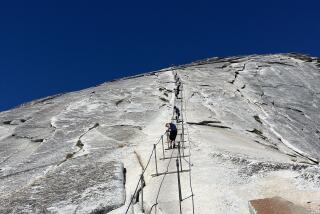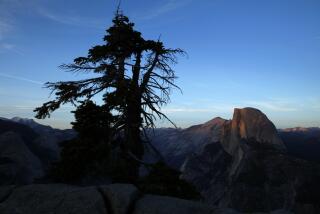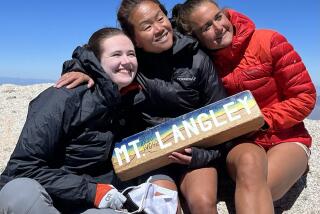Heart Patient Triumphs in Uphill Battle
It had been a long way back for Kelly Perkins since her heart transplant in November, but the last 200 yards promised to be the toughest.
Behind her were eight miles of steep trails leading to the implacable granite face of Half Dome in Yosemite. In front, the final 200 yards--a stretch of rock so sheer that steel cables are planted to help hikers pull themselves to the top.
But compared to her heart problems of the past four years, the famous 4,100-foot cliff didn’t seem insurmountable.
“I just got more psyched as I got [near] the top,” the 35-year-old Laguna Niguel resident said. “After everything, I wasn’t going to stop without making it.”
Lungs gasping for air, heart pumping steadily and strong, Perkins reached the summit and turned to her husband, Craig Perkins. “We gave each other high fives and hugged,” she said. “It was an incredible feeling.”
As innovations help refine the science of heart transplantations, it isn’t uncommon for transplant patients to regain their former lifestyles. But doctors say that Perkins’ quick recovery from her surgery and her triumph over complications have been nothing less than amazing.
Her condition was diagnosed as cardiomyopathy--a weakening of the heart that in her case was caused by a viral infection--in 1992 and was put on a waiting list for a new heart.
When her condition took a turn for the worse a year ago, Perkins qualified for a transplant, but her body rejected the new organ.
“I got this break, a new heart, and still it didn’t work,” she said.
In April, doctors performed a new procedure on Perkins called photophoresis, which irradiates the patient’s blood with ultraviolet light to stop white blood cells from attacking the donor heart.
“Kelly turned around quite dramatically,” said Dr. Jon Kobashigawa, director of UCLA Medical Center’s heart transplant program. “It’s been a remarkable recovery.”
Within two months, Perkins felt well enough to resume her active lifestyle of walking, running, skiing and working out in the gym. The plan to hike Half Dome last week was made for no particular reason “other than we always wanted to do it,” she said.
Perkins credits her quick recovery to her husband, family and the healing power of laughter.
“It’s not like we’ve lived this without tears,” she said. “There have been a lot of difficult moments. It’s so easy to get depressed or give up.
“But when things were really bad, Craig and I were able to look at each other, say ‘It could be worse,’ and laugh. That was so important for us.”
More to Read
Sign up for Essential California
The most important California stories and recommendations in your inbox every morning.
You may occasionally receive promotional content from the Los Angeles Times.










